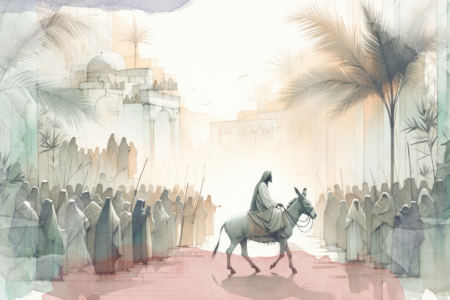Countdown To Destiny
“Pray for the peace of Jerusalem; They shall prosper who love Thee.”
The walls of the beloved city have again reverberated with the shock waves of war. Jerusalem, the city of Peace, has been visited by devastation more often than any surviving metropolis in the world. Invading marauders in ancient days leveled her to the ground on more than one occasion. Since the re-establishment of the State in 1948 she has been repeatedly encircled by the maelstrom of wars that have threatened the very existence of the nation. And yet, out of each struggle it becomes more evident that Jehovah is moving the people and the land toward a triumphant grand finale that will see all of the long-sought promises of King and Kingdom come to glorious fulfillment.
The last two conflicts have provided emphatic examples of the progressive Divine program that will ultimately see Israel fully reconciled to God. The Six Day War of June ’67 was, in many respects, a military miracle. It served to establish certain undeniable facts concerning end-time events. While at this writing the Yom Kippur War is not technically concluded, enough has transpired to allow for solemn and enlightened reflection.
The Six Day War
This war must be acknowledged as unparalleled in the history of the Jewish people. Its duration, the achievements of the Jews, and the odds over which they triumphed are unequaled even in the most illustrious days of Joshua and David. There is not the slightest shred of doubt: God was the Commanding General over the Israeli forces. As in days of old, they routed an overwhelmingly superior force with what seemed to be ridiculous ease. The victory heralded several things.
A NEW ERA—In six days the nation had gained defensible borders, Old Jerusalem, and a renewed solidarity among world Jewry. The buffers that were gained with the Arabs pushed off the Golan Heights and out of the Sinai ushered in a new day for national development. The reunification with Old Jerusalem gave the nation fulfillment of the long and cherished dream to again possess the most holy of all places—the Temple Mount The nation’s spiritual heart again pulsated in the midst of its own people. These events, coupled with the astounding military accomplishments brought about a reawakening of interest and involvement by world Jewry in the State of Israel.
A NEW SPIRIT—The victory brought with it a flood tide of national pride that swept through Jewish communities across the world. The Gentile nations—friend and foe alike—evinced unrestrained awe over what had transpired. Travelers in Israel were at once arrested by the loyalty and enthusiasm of the old and young alike for the land. Military service was a privilege. When speaking about the government it was always what “we” are accomplishing. It was a spirit that wafted a refreshing breeze over a cynical, weary world. Everything was colored by a magnificent optimism. They are fully convinced of being a miracle people who could, indeed, make miracles happen. A man who was in the Israeli air force expressed it for the nation when he told the writer: “God was with us! If the Arabs want to attack us, let them come; we will defeat them all.” The spirit was one of total invincibility. It was good to be a Jew.
A NEW TIMETABLE—While it escaped the notice of the unspiritual observer, those acquainted with the prophetic Scriptures were waking up in the night with words of Jesus racing through their minds. “And they shall fall by the edge of the sword, and shall be led away captive into all nations: and Jerusalem shall be trodden down of the Gentiles, until the times of the Gentiles be fulfilled” (Luke 21:24). The Star of David was catching the breeze over Old Jerusalem for the first time since before Jesus uttered the historic prophecy nearly two thousand years ago. Hallowed Mt, Moriah was nestled within the environs of the Jewish State, under Jewish control, for the first time since the days of the Babylonians—with the exception of the brief respite enjoyed during the days of the Maccabees. The question immediately is posed as to whether the Jews have possessed Jerusalem permanently, or if this is a temporary occupation. The obvious answer to the question is that we do not know. At this point it is one of the three non-negotiable areas taken by Israel in 1967. If Jewish resolution to keep the Old City has any weight, it will not be surrendered. It was Moshe Dyan who said, while standing before the revered Wailing Wall: “We earnestly stretch our hands to our Arab brethren in peace, but we have returned to Jerusalem never to part from her again.”
It is important that we resist the temptation of reading too much, prophetically, into contemporary events. We do not know how many more wars and rumors will yet engulf the city and the people. While we can not set dates, and would certainly not attempt to do so, it seems well within the mark of certitude to say that the timetable of end-time events is unfolding before us and the countdown toward the revelation of the Messiah is on.
THE YOM KIPPUR WAR
The complexion of the latest war is almost a complete turnabout from the previous one. It proved to be the type of conflict Israel is least prepared for—a protracted struggle against a determined foe. Even holding territories finally gained in Syria and Egypt is a costly endeavor. Citizen soldiers have been kept too long from their jobs and businesses. The effect has been felt over the entire nation. There has been a growing air of misgiving and quiet apprehension developing. During the war Dr. Hans Kreitler, founder of the Psychology Department at Tel Aviv University, said: “It’s a war with a bad taste—so bad a taste that even when there is good news, the people are not happy.” It was reported that civilians seeking treatment for depression at mental health centers has increased ten percent since the outbreak of the war. The cost of this war, in manpower alone, was felt in every city and hamlet in Israel. One Jewish observer commented: “We fought for our existence. We didn’t even fight for peace. Therefore, all of our reactions were rather sobering.” Perhaps the most significant observation, was made by an Israeli psychologist who pointed out that this war dispelled the comforting view of “seeing themselves as supermen and the other side as permanently inferior and destroyed, their ideas of security.”
The spectre of anti-Semitism again beclouds the horizon for the Israelis as the Arabs squeeze Europe, Japan, and America through oil reductions. Japan has already reviewed her stand on Israel and taken a pro-Arab turn. America is reportedly pressuring Israel to make large concessions to the Arabs in order to relieve the situation. With a long, cold winter in prospect for the western nations and the finger of accusation pointed at the Jews, we do face the regrettable possibility of a new wave of the old hostilities.
This war has illustrated vividly that:
PROLONGED CONFLICT CANNOT BE ENDURED. The price in manpower drain simply cannot be met. If the Arabs can periodically initiate a conflict of the latest type, Israel must eventually succumb.
RUSSIA IS EAGERLY AWAITING THE OPPORTUNITY TO ENTER ISRAEL AND THE ARAB STATES AS A MILITARY PRESENCE. The Arabs are inexorably snared in the Russian net. Since 1955 ten Arab countries have fallen to the temptation of accepting arms from the Soviet Union. Of these ten nations seven are supplied mainly, or exclusively, by Russia. Nine Middle
Eastern nations surrounding Israel now receive economic aid from the U.S.S.R. Russian naval forces are rapidly becoming dominant in the Mediterranean. Since 1965 the Soviet Mediterranean Squadron has been a constant naval presence. The growth of Russian sea forces in the last decade has been phenomenal. For example: between 1960 and 1970 they increased nuclear submarines from 3 to 70. Guided missile craft jumped from 10 to 170. In addition to facilities for aircraft the Soviets maintain seven naval installations on the Mediterranean, Red Sea and Indian Ocean. It is noteworthy that while the Russians have been pursuing a course of determined infiltration, the restern World has followed a course of near abandonment of influence. The sobering fact is that the only hindrance to direct Russian intervention in the October war was the adamant refusal of the United States to allow them to intervene. Of course, Biblical students understand that Russia will come down —Ezekiel 38 and 39, as well as other passages, clearly indicate this. The only unresolved question is when?
AMERICA’S WILL AND ABILITY TO DEFEND ISRAEL IS INCREASINGLY TENUOUS. Golda Meir is reported to have confided to President Nixon that she felt Israel could not trust the United States to keep agreements. Syndicated, columnist Russell Kirk stated, a short time ago: “For courage, as for arrogance, the Israelis are unmatched in our time. Yet material resources, as well as numbers, favor the Arabs. Even the backing of the United States may not suffice Israel in the long run.” Mr. Kirk further observes that “Israel’s sole firm ally is the United States; and America is tired of military involvements at the ends of the earth. As Senator J. William Fullbright suggests, 75 or 80 members of the U. S. Senate may be automatically committed to the Israeli cause; yet even that may not suffice to secure much longer the unqualified support of Washington for Israeli interests.” Columnist John Chamberlain, in a recent editorial titled: “Moscow Only Mideast Victor suggests that continuing internal strife is inhibiting the U.S. from playing a bold hand in foreign affairs. “It takes a reasonably united country to sustain a successful foreign policy.”
If we are, in fact, entering a period when internal problems will render the U.S. impotent, or if future American leadership takes a turn. toward the Arabs for want of oil, little Israel will be left without a friend. Viewing realistically the designs of Russia and the Arabs toward her, the glaring reality is: alone, she will not be able to survive!
We can safely conclude that the day will come when Israel is left without a friend to help. Again, it is not a question of if—only when, She will then have reached the climactic point of God’s purpose for Abraham’s seed. It is then that she will keep her long-promised appointment with Jehovah. Every weary footstep in. the wanderings of the dispersion; all the gravestones from the Wilderness to the far reaches of the Gentile kingdoms; each track laid by eager pilgrims returning to possess their land, are arrows that point to the day of Divine reconciliation. Zechariah says it clearly: “Then shall the Lord go forth, and fight against those nations, as when he fought in the day of battle. And his feet shall stand in-in the day upon the mount of Olives, which is before Jerusalem on the east, and the mount of Olives shall cleave in the midst thereof toward the east and toward the west…” (Zechariah 14:3, 4a).
The hope of Israel—the only ultimate answer—is the intervention of God Himself through the promised coming of the Messiah. “And I will pour upon the house of David, and upon the inhabitants of Jerusalem, the Spirit of grace and supplications; and they shall look upon me whom they have pierced, and they shall mourn for him, us one mourneth for his only son, and shall be in bitterness for him, as one that is in bitterness for his first-born” (Zechariah 12:10), Who is the pierced King who is promised to come and deliver Israel? It is the One who declared before He was crucified to a people who had rejected Him: “Behold, your house is left unto you desolate. For I say unto you, Ye shall not see me henceforth, till ye shall say, Blessed is he that cometh in the name of the Lord” (Matthew 23:38, 39).
Jesus Christ promised to come to Israel when Israel became willing to come to Him. That day will come. The glorious fact is that what will come soon for the nation is now available to Jew and Gentile alike as individuals. We, too, must see that we are helpless, without a friend to aid, and turn to Jesus Christ as Savior and Lord.







